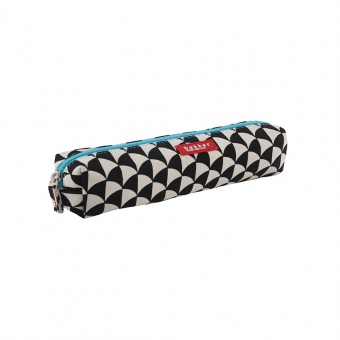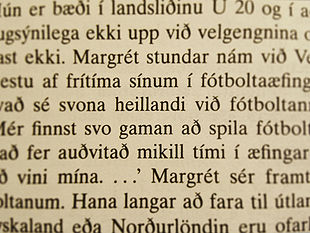While searching through my idea files, I found a journal entry from my second week of teaching in France twelve years ago. I’ve tweaked it, but it’s just too funny not to share. So today’s slice is a memory:
Week Two begins and all is well in the world of the Lycée. After the topsy turvy beginning of the French school year, today felt like time to get down to business.
My première class (11th graders) started at 8am (poor things – teenage body clocks just aren’t set for that time!) by writing their (required) summer reading essay. I brought an electric kettle, tea, and coffee to help their brains get moving – and N brought in a few store croissants. I’m not convinced any of them could make heads or tails of One Hundred Years of Solitude by reading it on their own over the summer, and I’m sad that I had to assign this essay before we discussed it. I told them to think of it as practice for when you really don’t know what you’re doing: you come up with something and make damn sure the writing is good because you know the content isn’t. At least I made them laugh before they began. Still, who wants to start the year handing the teacher an essay that doesn’t really represent their ability? Ah well. They wrote for the entire 90 minutes – not one finished early.
All French students have a “trousse”. The technical translation of this is “pencil case”, but the truth is much more complex. A trousse holds the keys to success in the French school system.

Much like Mary Poppins’ magic carpet bag, the trousse might contain anything: I have seen students reach into their trousse and come up with pencils, ball point pens, ink pens, colored pencils, markers, ink-pen erasers with blue write-over tips, rulers, scissors, small staplers, paperclips, ponytail holders, small dictionaries, cell phones, TVs, entire living room sets, deeds to houses, and occasionally originals of the constitutions of various small countries. Every writing task involves a variety of colors and steps: even note-taking requires straight edges to underline headings, colors to show what point goes with what and careful ordering of the points the teacher makes. Me? I make regular use of mind-maps and often end class with a chalkboard full of arrows and circles. So far I’ve resisted the temptation to see how my very organized students are possibly using straight-edges and magic eraser to make sense of my crazy notes, but I’ve already started dreaming up days of mild torture: using multiple colors of chalk haphazardly, starting phrases and then crossing them out, beginning an organized chart then erasing it – or adding to it – in the middle. Someday I’m going to steal all their straight edges and see what happens. I imagine the entire classroom will devolve into chaos.
My 5ème class – the 7th graders – has no problem talking, though I suppose some would argue about how much thought goes into it. They continue to amuse me and I suspect will do so all year. We are preparing for Beowulf – the big beginning comes tomorrow when we actually start reading! Today was all about Anglo-Saxon riddles. Last week this group got very involved in writing out their own epic quests (L’s heroic test was being forced go to the planet of the nerds and dress like a nerd for a week; someone else’s superhuman gift was smelling chocolate 2 miles away), so you can imagine that riddle solving and riddle-writing was a big hit. M was so proud of his short riddle that he forgot to pause at the end and told us the answer the minute he finished reading it. J told two riddles in a row about spiders (after using Spiderman as his example of an epic hero on Friday), but then fooled us all by telling a third riddle… about a pencil. Today they also saw Old English for the first time, and I was definitely worn out because it took me a full three minutes to get them to stop discussing whether it looked more like Swedish, German or Icelandic. Icelandic?

When have they ever seen Icelandic? Sheesh. I can’t wait to get these kids dressed as ancient warriors or to have them re-enact the scene where Beowulf tears Grendel’s arm off. I’m convinced we’re going to get in trouble somehow or another; it’s really only a matter of time with these guys. Sometimes they can’t even quite stay in their seats as we talk. It’s going to be a great year.
Thank heavens for my one hour lunch break. I’m not sure I could have managed two more classes without some food! As it was, when I got to the 4ème class, the 8th graders definitely had a little more control of the room than I did. Perhaps it was because I told them that Petrarch wrote hundreds of sonnets to a woman he only ever saw once in church and never really met; or maybe it was because one of the students figured out early on that they had to write a sonnet for homework. Slowly, the class began to revolve around two themes, neither of which were exactly my point for the day: “but I don’t understand why he didn’t just talk to her” and “wait, it has to rhyme AND be in that rhythm thing we wrote last night?” Um , yeah, that iambic pentameter thing.

So I found myself repeating, again and again, variants of “he couldn’t talk to her and, yes, all sonnets are written in iambic pentameter.”
“But I don’t know that many rhyming words.”
“Does it have to make sense?”
“Was she married?”
“If she was married, dummy, she just could’ve gotten a divorce.”
“Not back then.”
“How would you know?”
“What if it doesn’t rhyme? Will that count off?”
“Oh no – Shakespeare wrote a different kind?”
“Which kind do we have to do?”
“But Shakespeare met the women he wrote about.”
“Do they have to be about girls?”
“I would never have written that many poems about somebody I didn’t even talk to.”
And on we went. Needless to say, we did not have time to try to put together cut up sonnets, nor did we get to Romeo and Juliet’s first scene together when they actually speak two sonnets in a row. By the end of the class, I felt a little bit like the Wicked Witch of the West as she melts and cackles, “Oh, my plans, all my beautiful plans!” Heck, when class came to an end, I felt lucky that anyone actually knew the word sonnet; if they figure out that it’s somehow related to Romeo and Juliet, I think I will be ahead of the game.
And thus I have started my second week. In 5ème L is already one of my sweeties and he knows it. I still don’t know the names of half my 4ème or Seconde classes. Somehow I have to get my 5ème through Beowulf, my 4ème through Romeo and Juliet and my Première through Crime and Punishment; and my Secondes will grimly plod through Huckleberry Finn unless I can get them to engage. And in all of this, I’m supposed to settle in to France, get my paperwork completed and keep my sanity. I’m sure that can all happen – I’m just not sure it can all happen to me. But, as Kurt Vonnegut said, and as precisely none of my Secondes understood (perhaps because half of their essays relied heavily on internet sources), “so it goes”.
And so it does go.

A memory slice- what a great idea! I enjoyed hearing the snippets of conversation from your classroom, learning about magic pencil bags, and your teaching adventures in France! I could really use some coffee and a croissant about now.
LikeLiked by 1 person
Coffee and a croissant pretty much always sound good. 🙂
LikeLiked by 1 person
What a lively glimpse into your day. Who knew that a pencil case was the repository of so many wonderful and practical things?
LikeLike
This makes me curious about the 12 years since. How long did you stay in France? Are you still there? Pretty captivating storytelling to be sure.
LikeLiked by 1 person
Thanks! While I took the job assuming I would stay semi-permanently,I only ends up staying one year because I moved to Canada (of all places!) to be with my new hubby. In some ways, being there for a year has kept my first impressions fresh; on the other hand, I am constantly aware that I only scratched the surface of the culture.
LikeLike